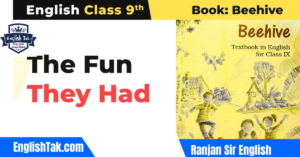![]()
GLIMPSES OF INDIA BOARD EXAM 2022 QUESTIONS
All the important questions from GLIMPSES OF INDIA BOARD EXAM 2022 QUESTIONS will be discussed in this post.
GLIMPSES OF INDIA
I. A BAKER FROM GOA
– Lucio Rodrigues
INTRODUCTION
About the Author : Lucio Rodrigues was one of the few outstanding Konkani essayists. An authority on Coan folklore, he made many contributions, like in The Goan Tribune, The Times of India and Goa Today.
About the Chapter: A Baker from Goa is a pen-portrait of a traditional Goan village baker who still has an He also featured on All India Radio and Radio Goa.
important place in the author’s society.
KEY POINTS
• The elders in Goa are nostalgic about the good, old Portuguese days and their famous loaves of bread.
• Portuguese have left but bakers still exist in Goa.
• The bakers in Goa are called paders.
• The pader was an important person during old times in Goa
• The father may not be alive but the son still carries on the profession of bread-making.
• The thud and the jingle of the traditional baker’s bamboo can still be heard in some places.
• The author can still recall the typical fragrance of those loaves.
• He remembers that the baker was a friend, companion and guide to all the children in the village.
• He used to come twice, once when he set out in the morning, on his selling round, and then again when he returned after emptying his huge basket
• The children ran to meet him on hearing the jingling thud of his bamboo.
• They loved the bread bangles, which he brought especially for them. They used to surround him and peep into his basket.
• Sweet bread called bol was a must as marriage gifts in Goan culture.
• Cakes and bolinhas are a must for Christmas and other festivals for the Goans therefore the baker is an important part of the Goan people.
• The baker, during the Portuguese time, used to wear a peculiar special dress known as the Kabai.
• It was a single-piece long frock which reached down to the knees.
• During the author’s time the bakers used to wear a shirt and trousers which were shorter than full lengths one and longer than half pants.
• Bills were collected by the baker at the end of the month.
• Monthly accounts used to be recorded on some wall in pencil.
• Baking was a profitable business in the old days.
• Their plump physique was evidence of their prosperity.
• Even today, a person with a jackfruit like appearance is easily compared to a baker, in Goa.
Suggested For You | |
| Grammar | EnglishTak YouTube Channel |
| Spoken English | Videos |
| Ranjan Sir Blog | Join Our WhatsApp Group |
[yarpp]
GLIMPSES OF INDIA BOARD EXAM 2022 QUESTIONS
SUMMARY
The elders nostaligically remember the good old Portuguese days and their famous loaves of brcad. Though the Portuguese have left, the mixers, moulders, age old furnaces, can still be found in Goa. Their presence, even today, bears testimony to the popularity of Bread making in Goa. The bakers in Goa are called paders.
The author remembers, how in his childhood, the baker used to come twice, once when he set out in the morning, on his selling round, and then again when he returned after emptying his huge basket. The children ran to meet him when they heard the jhang, hang sound of his bamboo staff. He was their friend, companion and guide. They loved the bread bangles that he bought for them. Loaves were for the elders and bread bangles for the children. They could not be stopped from gathering around the baker.
In Goan culture, no marriage ceremony is complete without the gift of sweet bread called bol. Cakes and bolinhas are a must for Christmas and other festivals. Therefore, the baker is an important part of the Goans.
The baker, during the Portuguese time, used to wear a peculiar, special dress known as the Kabai. It was a single-piece, long frock, which reached down to the knees. During the author’s time, the bakers used to wear a shirt and trousers which were shorter than full lengths one and longer than half pants. The baker collected the bills at the end of the month. Families used to keep a record of the monthly account of the baker, on some wall, in pencil. Baking was a profitable business in the old days. The baker and his family never starved. He and his family and servants always looked happy and prosperous. The plump plıysique of bakers was evidence of their prosperity. In Goa, even today, a person with a jackfruit ike appearance, is easily compared to a baker.
[yarpp]
PASSAGES FOR COMPREHENSION
Read the following passages carefully and answer the questions that follow :
1. “Our elders are often heard reminiscing nostalgically about those good old Portuguese days, the Portuguese and their famous loaves of bread. Those eaters of loaves might have vanished but the makers are still there. We still have amongst us the mixers, the moulders and those who buke the loaves. Those age-old, time-tested furnaces still exisl. The fire in the furnaces has not yet been extinguished. The thud and jingle of traditional baker’s bamboo, heralding his arrival in the morning, can still be heard in some places.
Word-Meaning: Reminiscing – remembering; nostalgically – to remember something which happened in the past fondly.
Questions :
(a) What are the elders in Goa nostalgic about and why?
(b) What does the author mean by the fire in the furnaces has not yet been extinguished’?
Answers :
(a) The elders in Goa are nostalgic about the good old Portugese days. They remember the baker fondly because when Goa was ruled by the Portugese the baker was an important part of their lives and culture.
(b) The author means that the baker is still an important part of the Goan lives though not in the same way as he was in the past i.e., the good old Portugese days. The bakeries, the time-tested furnaces are still remniscent of the old days.
2. During our childhood in Goa, the baker used to be our friend, companion and guide. He used to come at least twice a day. Once, when he set out in the morning on his selling round, and then again, when he returned after emptying his huge basket. The jingling thud of his bamboo woke us up from sleep and we ran to meet and greet him. Why was it so ? Was it for the love of the loaf?
Word-Meaning: Companion – comrade or confidante; guide – a person who advises or shows the way to others.
Questions :
(a) How does the author remember the baker?
(b) Why did the children run to meet the baker?
Answers :
(a) The author remembers the baker as a friend, companion and guide of the children who looked forward to his visit The children woke up from sleep on hearing the jingling thud of his bamboo and they ran to meet and greet him.
(b) The children ran to meet the baker not for the sake of the loaf which he bought but for the bread-bangles, which they chose carefully. Sometimes it was sweet bread.
[yarpp]
3. We kids would be pushed aside with a mild rebuke and the loaves would be delivered to the servant. But we would not give up. We would climb a bench or the parapet and peep into the basket, somehow. I can still recall the typical fragrance of those loaves. Loaves for the elders and the bangles for the children.
Word-Meaning: Parapet – a low wall along the edge of a balcony, roof and bridge; peep look into; recall – remember; typical – distinctive; fragrance – sweet smell.
Questions:
(a) Why were the children pushed aside?
(b) Winy would the children not give up?
Answers :
(a) The children were pushed aside with a mild rebuke because they would surround the baker, making it difficult for the baker to deliver the bread to the maids.
(b) The children would not give up because they loved bread bangles so much that they would climb a bench or the parapet just to peep into the basket
4. Loaves for the elders and the bangles for the children. I can still recall the typical fragrance of those loaves. Then we did not even care to brush our teeth or wash our mouths properly. And why should we ? Who would take the trouble of plucking the mango-leaf for the toothbrush ? And why was it necessary at all ? The tiger never brushed his teeth. Hot tea could wash and clean up everything so nicely, after all!
Word-Meaning : typical – distintive; fragrance – sweet smell; loaves – quantity of bread that is shaped and baked in one piece; Plucking – pull off.
Questions :
(a) Why does the author say that they didn’t care to brush their teeth?
(b) Why does the author feel nostalgic?
Answers :
(a) The author says that they didn’t care to brush their teeth because of their excitement at the arrival of the baker. The bread-banglesm, which he brought, were so tempting that they woke up as soon as they heard the jhing jhang sound of his specifically made bamboo stick and just ran towards him.
(b) The author remembers his childhood when the visit of a baker was a normal routine. He could still smell the fragrance of loaves. With the changing times, the sight of a baker delivering bread at one’s doorstep, with his special bamboo stick and basket, can no longer be seen.
5. Marriage gifts are meaningless without the sweet bread known as the bol, just as a party or a feast loses its charm without bread. Not enough can be said to show how important a baker can be for a village.
Word-Meaning : Meaningless – having no significance; charm – attraction; furnace – an enclosed structure in which material can be heated to a very high teperature.
Questions:
(a) What is the importance of a baker in the Goan village ?
(b) (i) The antonym of ‘meaningless’ is……
(ii) The antonym of ‘essential is…….
Answers :
(a) The baker is an important part of a Goan life. No celebration be it parties, festivals, engagements or marriages are complete without bread. ‘Bol’ i.e., sweet bread is a must for a party or feast. Sadwiches on the ocassion of engagements and Cakes and bolinhas are served at Christmas and other festivities.
(b) (i) meaningful
(ii) inessential/unimportant
6. The baker and his family never starved. He, his family and his servants always looked happy and prosperous. Their plump physique was an open testimony to this. Even today any person with a jackfruit-like physical appearance is easily compared to a baker.
Word-Meaning : Starved – died from hunger; prosperous – flourish financially, plump – fat; testimony-proof
Questions:
(a) Why didn’t the baker’s family ever starve ?
(b) Winy do we compare a person with a jackfruit-like appearance to a baker ?
Answers :
(a) The baker and his family never starved because a baker was important for the Goans. Bread made by a baker was a must for a Goan family. No festival, celebration, party or feast was complete without items made from bread. Thus, a bread and items made by the baker were always in high demand.
(b) A person, with a jackfruit like appearance, is fat with a bulging tummy, is compared to a baker, even today, because the baker, his family and servants had a plump physique being happy and prosperous.
[yarpp]
COMPREHENSION CHECK QUESTIONS
Q.1. What are the elders in Goa nostalgic about?
Ans. The elders in Goa are nostalgic about the good old Portugese days, and their famous loaves of bread.
Q.2. Is bread making still popular in Goa ? How do you know?
Ans. Yes, bread making is still popular in Goa. We know this because even today the age-old, time tested furnaces still exist.
Q3. What are these bakers called ?
Ans. These bakers, are even today, called pader in Goa.
Q4. When did the baker come everyday ? Why did the children run to meet him?
Ans. The baker used to come at least twice a day. Once, when he set out in the morning, on his selling round and once again when he returned after emptying his huge basket. The children ran to meet him for they longed to have the bread-bangles which he brought with him. Sometimes it was sweet bread of special make.
Q.5. Match the following. What is a must
| (i) as marriage gifts ? | – cakes and bolinhas |
| (ii) for a party or a feast? | – sweet bread called bol |
| (ii) for a daughter’s engagement ? | – bread |
| (iv) for Christmas ? | – sandwiches |
| Ans. () as marriage gifts ? | – sweet bread called bol |
| (ii) for a party or a feast? | – bread |
| (iii) for a daughter’s engagement? | – sandwiches |
| (iv) for Christmas ? | – cakes and bolinhas |
Q.6. What did the bakers wear:
(i) in the Portugese days?
(ii) when the author was young?
Ans. (i) In the Portugese days the bakers wore a peculiar dress known as kabai. It was a single piece long frock reaching down to the knees
(ii) When the author was young the baker wore a shirt and trousers which were shorter than full-length ones and longer than half pants.
Q.7. Who invites the comment – “he is dressed like a pader”? Why?
Ans. Even today, any person, who wears a half pant which reaches just below the knees invites the comment that he is dressed like a pader.
Q.8. What does a ‘jackfruit-like appearance’ mean?
Ans. A jackfruit like physical appearance means a plump physique.
GLIMPSES OF INDIA BOARD EXAM 2022 QUESTIONS
TEXTBOOK QUESTIONS
Q.1. Which of these statements are correct?
(i) The pader was an important person in the village in old times.
(ii) Paders still exist in Goan villages.
(iii) The paders went away with the Portugese.
(iv) The paders continue to wear a single piece long frock.
(v) Bread and cakes were an integral part of Goan life in the old days.
(vi) Traditional bread baking is still a very profitable business in the present times.
(vii) Paders and their families starve in the present times.
Ans. (1) Correct, (ii) Correct, (11) Wrong, (iv) Wrong, (v) Correct, (vi) Correct, (vi) Wrong.
Q.2. Is bread an important part of Goan life? How do you know this?
Ans. Yes, bread is an important part of Goan life. There is no party or festivity without bread. Marriage gifts are meaningless without the sweet bread known as the bol. The lady of the house must prepare sandwiches on the occasion of her daughter’s engagement. Cakes and bolinhas are a must for Christmas as well as other festivals.
Q.3. Tick the right answer:
What is the tone of the author when he says the following ?
(i) The thud and the jingle of the traditional baker’s bamboo can still be heard in some places. [nostalgic hopeful, sad]
(ii) May be the father is not alive but the son still carries on the family profession. [nostalgic, hopeful, sad]
(iii) I still recall the typical fragrance of those loaves. [nonstalgic, hopeful, naughty]
(iv) The tiger never brushed his teeth. Hot tea could wash and clean up everything so nicely, after all. [naughty, angry, funny]
(v) Cakes and bolinhas are a must for Christmas as well as other festivals. [sad, hopeful, matter-of-fact]
(vi) The baker and his family never starved. They always looked happy and prosperous. [matter-of-fact, hopeful, sad]
Ans. (i) hopeful
(ii) hopeful
(iii) nostalgic
(iv) funny
(v) matter-of-fact
(vi) matter-of-fact
[yarpp]
GLIMPSES OF INDIA BOARD EXAM 2022 QUESTIONS
SHORT ANSWER QUESTIONS
Answer the following questions in about 20-30 words:
Q.1. Why would the baker come everyday? What announced his arrival ?
Ans. The baker would come everyday to deliver the loaves of bread to the houses. He would carry the traditional bamboo staff and its jhang, jhang sound would announce his arrival.
Q.2. What would the baker do after his musical entry?
Ans. After his musical entry, he would greet the lady of the house with good morning’ and then place his basket on the vertical bamboo.
Q.3. How did he treat the kids who surrounded him ?
Ans. The pader was very kind and tolerant. When the kids would surround him he would push them aside with a mild rebuke.
Q.4. Why does the author wish to imply by the tiger never brushed his teeth”?
Ans. The author wants to stress that the children were so fond of bangles that they did not even care to brush their teeth or wash their mouths properly, when the baker announced his arrival.
Q.5. How did the baker become synonymous with celebrations and occasions in Goa ?Ans. Marriage gifts, parties and feasts, festivals in Goa are all incomplete without bread. Sweet bread, sandwiches, cakes, bolinhas are an integral part of the Goan culture.
[yarpp]
GLIMPSES OF INDIA BOARD EXAM 2022 QUESTIONS
SHORT ANSWER QUESTIONS
Answer the following questions in about 40-50 words:
1. Inspired by the diversity in the chapter, “Glimpses of India’, you wrote an article for your school magazine on the topic, ‘Diversity-the Uniqueness of India’. Write a paragraph, sharing two key opinions from the article. [CBSE Question Bank]
Ans. “Glimpses of India’ offers a journey into different landscapes, customs and cultures of India. We visit the Goans, impacted by their Portugese heritage, the Coorgs with their Greek and Arab origin, the Buddhist culture through their settlement, and the tea plantation of Assam with Rajvir. The chapter thus highlights the uniqueness of India – a result of its diversity.
2. How do the Goan people react to their colonial past?
Ans. The Goan people are quite attached to their colonial past under the Portuguese rule. They still remember those days as the good old Portuguese days and their famous loaves of bread.
3. Is bread-making still popular in Goa ? How?
Ans. Bread-making is like a tradition in Goa. Though the old bakers have died but their sons have carried the legacy forward. The age-old furnaces still exist and are still in use. The process of baking is still the same like it was during the Portuguese rule. It shows that bread-making is still popular in Goa
4. How did the children get along with the baker?
Ans. The children were attracted to the sweet fragrance of the bread loaves. They liked to eat the bread-bangles or the special sweet breads meant for them. Moreover, they treated the baker as their friend, companion and guide. So they would run to meet him.
5. How do you know the kids were excited about the bread ?
Ans. They would surround him. When they were not able to see what was inside the basket they would climb on a bench and peep into the basket to get the sweet fragrance. They would eat the bread even before brushing their teeth
6. The tiger never brushed his teeth.’ Why does the author say so?
Ans. The children are as free as the tiger in the jungle. They do not care about brushing their teeth or washing their mouths. They start eating as soon as they wake up. The author presents their carefree attitude by supporting it with the example of a tiger.
7. What are the different varieties of bread? Which occasions are they associated with ?
Ans. Different varieties of bread are – bol, cakes and bolinhas. These are traditionally associated with different occasions
e.g.
The sweet bread bol as a marriage gift
The sandwiches are essential on engagements and
The cakes and bolinhos are must on Christmas and other festivals.
8. How was baking a profitable profession?
Ans. Baking was really a profitable profession as the bread was an important part of the food of the Goan people. The bakers earned well and kept servants. They were plump. Their families looked happy and prosperous. They never starved.
9. What image of a baker comes before the eyes on reading ‘A Baker from Goa’?
Ans. A Goan baker appears to be a plump and healthy man, wearing the traditional Kabai dress. He carries a bamboo staff and a huge basket. He is welcomed and respected everywhere. He is called a pader’
10. What importance does a baker enjoy in a Goan village ?
Ans. A baker is very important and essential for a Goan village. Hedoes not merely represent a profession but a highly admired Portuguese tradition. His breads are essential on each and every occasion. He enjoys respect and love of the people. The children consider him their friend, companion and guide.
[yarpp]
GLIMPSES OF INDIA BOARD EXAM 2022 QUESTIONS
LONG ANSWER QUESTIONS
Answer the following question in about 100-120 words:
Q.1. The narrator shares, “Baking was indeed a profitable profession in the old days.”
(a) What do you feel has changed now? Why? [CBSE Question Bank]
Ans. In the old times a pader was an important person who used to provide door to door service to villagers. Every Goan used to buy bread from the baker as their daily meal. Festivities were incomplete without bread thus baking was a lucrative profession and a baker the most soughe after. The bakers were wealthy which was evident by their physique. Today, though bakers are not as many in number as before but those in this profession are equally wealthy. The orly difference is that in the good old days bakirg ran in the family – the son inherited it from his father but these days anyone can get into the bakery career. The bakers do not go door to door selling their bakery items but on line door step service and purchasing bakery items directly from shops has become the order of the day.
(b) State any one way, you feel the paders can regain their lost glory. [CBSE Question Bank]
Ans. In oder to regain their lost glory, those engaged in the business of bakery need to create an aura around them perhaps they can have their employees wear the traditional kabai and make them put on a badge with ‘paders’ embossed on it. They must cornect the Goans to their past by perhaps organising fairs and exhibitions on paders, from time to time, reminding them of their rich past and cultural heritage.
2. In the chapter, ‘A Baker from Goa’ the narrator talks about his childhood in Goa and his fond memories.
Compare the childhood of Nelson Mandela with that of the narrator. [CBSE Question Bank]
Ans. Both Mandela and the author have been a part of history where indegenous people were not ruled by their own people, still as children they enjoyed their freedom. For a child even simple things in life brings joy. They are free from worries and not burdened by any responsibility. Thus childhood memories are sweet. For the author waking up at the jhang, jhang sound of the the baker’s bamboo staff and running to meet him without brushing his teeth, peeping into his basket for bangles is nostalgic Reference to ‘a tiger not brushing his teeth’ is an expression of freedom enjoyed in childhood. In his writing too, he refers to the elders reminiscing the Portugese Rule over Goa Mandela, too, recalls running in the fields near his mother’s hut, swimming in the clear stream, roasting mealies under the stars and riding the broad back of slow-moving bulls to define childhood freedom and its joys.
GLIMPSES OF INDIA BOARD EXAM 2022 QUESTIONS
3. Based on your reading of the chapter, write a paragraph on the topic : ‘The Custom of Baking Bread is Closely Associated With Goan Culture’.
Ans. The Custom of Baking Bread is Closely Associated With Goan Culture The culture of Goa is deeply influenced by the Portuguese culture. Bread forms an essential part of the Goan culture. There is no party or festivity without bread. Marriage gifts are meaningless without the sweet bread known as the voi. A baker is very important for a village. The lady of the house must prepare sandwiches on the occasion of her daughter’s engagement. Cakes and bolmas are a must for Christmas as well as other festivals. Thus, the presence of the baker’s furnace in the village is absolutely essential. Loaves of bread are very popular in Goa and is a staple food even in remote villages. The mixers, moulders, age old furnaces, curing Portuguese occupation of Goa ere still found in Goa
Source– U-LIKE
Important Link





